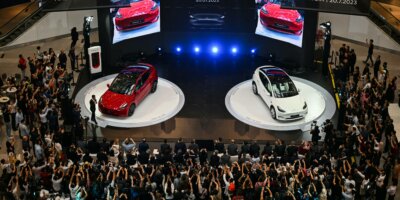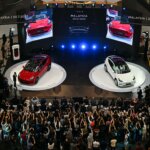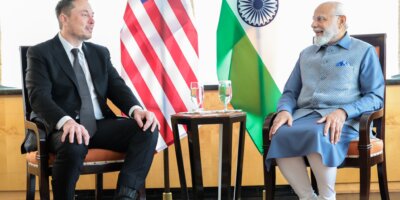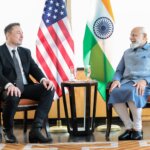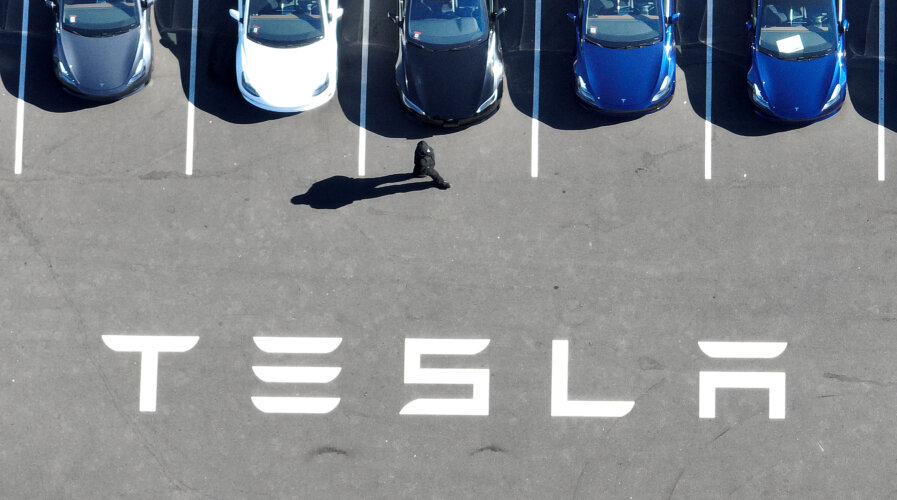
A potential Tesla factory in India could operate at total capacity by 2030.Photo: In an aerial view, brand new Tesla cars sit in a parking lot at the Tesla factory on October 19, 2022 in Fremont, California. Electric car maker Tesla will report third quarter earnings today after the closing bell. Justin Sullivan/Getty Images/AFP (Photo by JUSTIN SULLIVAN / GETTY IMAGES NORTH AMERICA / Getty Images via AFP)
India may slash import tax to entice Tesla and other EV companies
- The import tax in India, as proposed by Tesla, could be reduced to as low as 15% from the current 100% for cars above US$40,000, and 70% for the rest.
- The policy could also tempt other global carmaking giants to set up manufacturing facilities in India.
- A potential Tesla factory in India could operate at total capacity by 2030.
If there’s one thing India is infamous for among foreign automakers, its the ludicrous tax imposed on imported cars, which even Mercedes-Benz labeled as ‘outrageous’ – and arguably, that company knows a thing or two about outrageous costs. As an electric vehicle behemoth, Tesla even tried entering the Indian market in 2021 but was impeded by the 100% import tax on fully imported cars with CIF (Cost, Insurance, and Freight) values of more than US$40,000.
But after much back and forth, India, which has been hiking import duties on the pretext of nurturing domestic manufacturing, may finally succumb to the plea of international players, especially Tesla. Fresh reports indicate that the Indian government is considering slashing import tax on EVs for automobile manufacturers if they tie up with a local manufacturing unit.
According to a Reuters report, the move followed a proposal by Tesla, which is considering entering the domestic market. “The policy being considered could allow automakers to import fully-built EVs into India at a reduced tax rate as low as 15%, compared to the current 100% that applies to cars which cost above US$40,000 and 70% for the rest,” the report stated, quoting two sources, including a senior Indian government official.
Tesla and India – a good match?
For example, Tesla’s best-selling Model Y starts at US$47,740 in the US before tax credits. Should a Tesla car get imported into India, the buyer would pay double what buyers in the US and other Western markets would pay – unless the government reduced the 100% import tax.
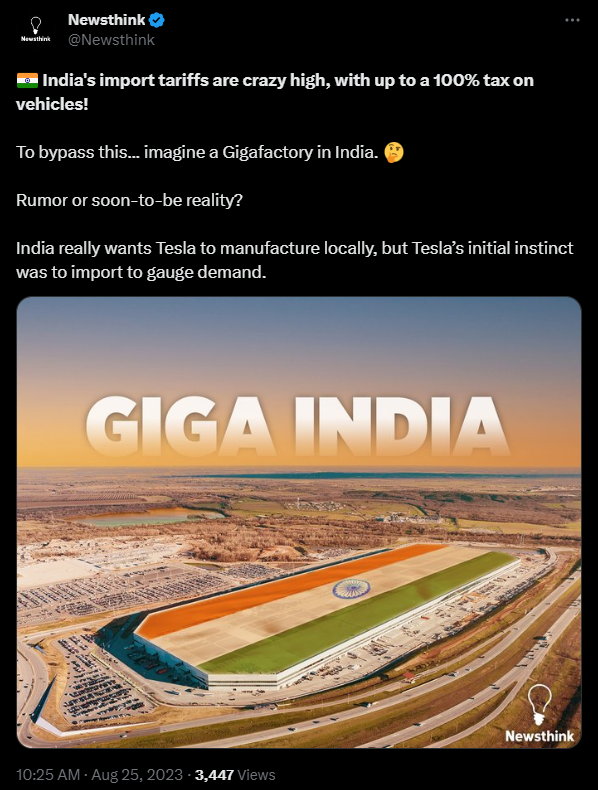
Source: Twitter
“There is an understanding with Tesla’s proposal, and the government is showing interest,” the official familiar with the issue told Reuters. When the Indian Finance Minister Nirmala Sitharaman was asked though, she told reporters, “There is no proposal in front of me” to reduce import duties on EVs.
Should India adopt such a policy, it could drastically reduce the cost of imported EVs – a move local carmakers have been keen to avoid. “That would then open the door for global automakers, beyond Tesla, to tap the world’s third-largest car market where sales of EVs are less than 2% of total car sales, but proliferating,” Reuters added.
However, New Delhi will have to move slowly considering the policy proposal, as lowering taxes on imported EVs could disrupt the market and upset local players like Tata and Mahindra, and stop them investing to build electric cars at home, sources told Reuters.
“This will go through many deliberations even though the government is keen on getting Tesla. That’s because of the impact on domestic players,” said the official. Two sources said the policy is still in the initial stages of deliberation, and the final tax rate could change.
Following Prime Minister Narendra Modi’s meeting with Tesla’s CEO Elon Musk in June, the EV giant has shown colossal interest in expanding into India. More recently, Tesla told Indian officials it is keen to set up a local factory and make a new EV priced around US$24,000, roughly 25% cheaper than its current entry model, for both the Indian market and export.
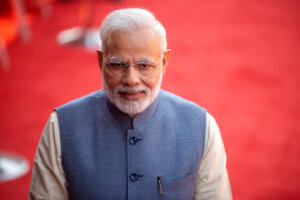
Prime Minister Modi will have to think hard before allowing Tesla into India.
Further to that, Tesla’s senior public policy and business development executive Rohan Patel has, in recent weeks, met top officials privately. Although Indian officials hinted there will be no special incentives for Tesla’s market entry, the sources said the proposal for a low import tax, conditional on a manufacturing commitment, was touted by Tesla to keep both sides happy.
A Tesla gigafactory in India by 2030?
One of the sources said Tesla even told Indian officials a potential India factory could operate at total capacity by 2030. Electric cars accounted for only 1.3% of all vehicles sold in the country between 2020 and 2021, according to research by digital consultancy Techarc. The government has a target for 30% of private cars to be electric by 2030 as part of a broader push to decarbonize the transport sector.
To turn that target into be turned into a reality, the government would have to make it more feasible for foreign carmakers to penetrate the Indian market. Tesla has shown a vested interest in the South Asian nation, with reports indicating an interest in building a factory in India that would produce low-cost EVs for the local market and export.
Sources have even told Business Today TV separately that the EV giant is set on creating a significant export hub in India, planning to target the Asian Pacific and African markets. Those sources indicate that Tesla is looking at potential sites in Southern India and Gujarat.
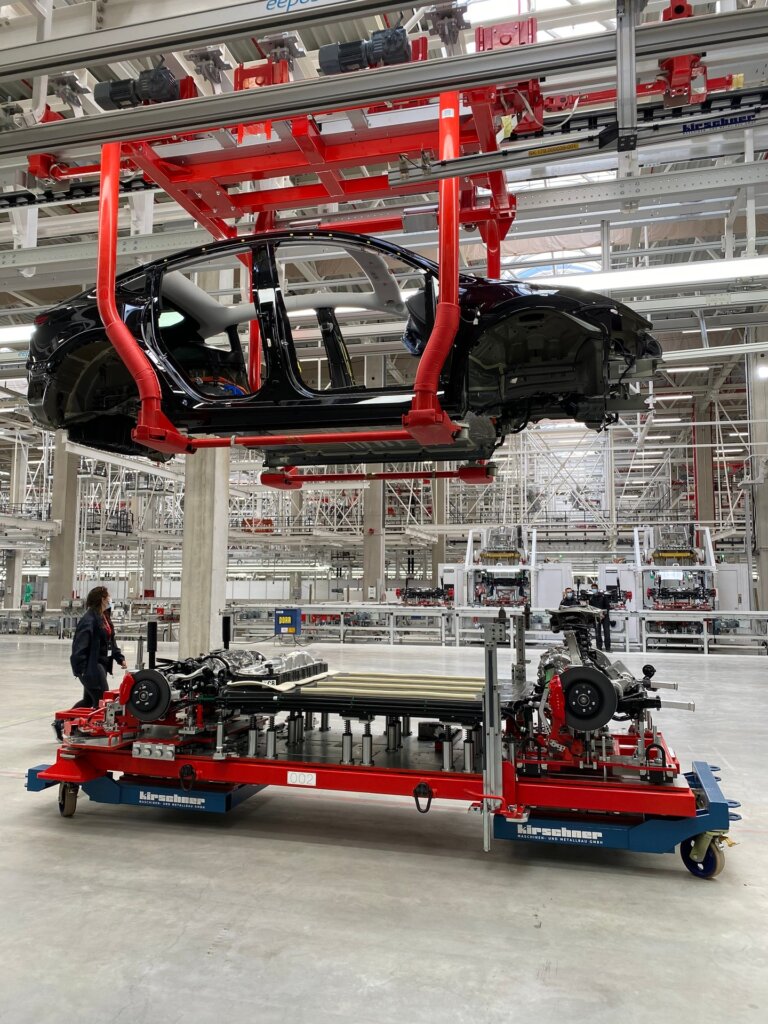
Coming to an Indian state newar you…soon?
“An initial proposal submitted by the company reveals ambitious plans to construct a gigafactory in India. This state-of-the-art facility is envisaged to have an annual production capacity of approximately half a million EVs,” Business Today said.
Following the reassurance from Modi himself, Tesla’s expansion will go beyond manufacturing operations. The Business Today report said Tesla aims to establish a comprehensive charging infrastructure throughout the country, addressing one of the critical concerns for the widespread adoption of EVs.
READ MORE
- 3 Steps to Successfully Automate Copilot for Microsoft 365 Implementation
- Trustworthy AI – the Promise of Enterprise-Friendly Generative Machine Learning with Dell and NVIDIA
- Strategies for Democratizing GenAI
- The criticality of endpoint management in cybersecurity and operations
- Ethical AI: The renewed importance of safeguarding data and customer privacy in Generative AI applications

